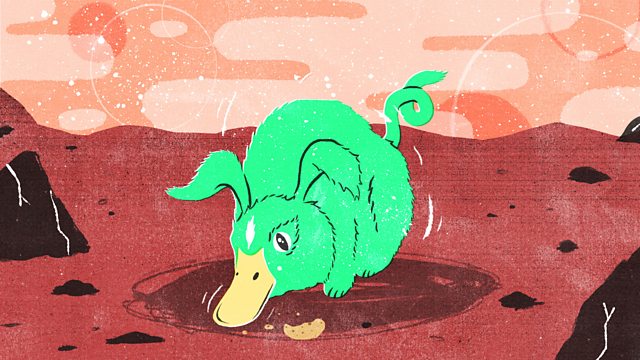Sociable Aliens
Christine Nicol explores the meaty problem of eating aliens. How would you decide? Jake the Spaceman crashes on a remote planet and has to eat the locals, but how does he choose?
In this 4 part series Christine Nicol, professor of Animal Welfare at the University of Bristol, explores the fascinating and challenging subject of animal sentience and welfare. To help delve into the nuances we set up an intriguing scenario...
Jake the Spaceman (aka comedian Jake Yapp) has crash-landed on a remote planet and doesn't have much food to keep him going until he is rescued. Fortunately, the planet is teeming with alien life forms that are edible, but which ones should he eat? He wants to cause the minimum amount of pain and distress to the creatures, so what does he need to know about the nature of the beings on the planet? Can they feel pain? If so, how can he minimise suffering? Will eating an alien cause distress to others? Is the alien so aware and sensitive to its environment that Jake needs to consider whether it is a non-human person?
Christine will interview animal welfare scientists, philosophers and wildlife biologists to get under the skin of animal sentience and the potential consequences of accepting that animals are conscious, aware creatures.
These big questions generate surprising and challenging insights into our attitudes to other life. When you know absolutely nothing about the alien in front of you, what do you need to know before eating it?
Last on
More episodes
Previous
Next
Dr Liesbeth Bolhuis

Many welfare and health problems in farm animals arise from a mismatch between the animals adaptive capacity and the conditions they are exposed to. We investigate how genetic background, early life experiences and characteristics of the environment influence behavioural and physiological processes that reflect or affect animal welfare, health and productivity.
Professor Nickie Charles

She is also beginning to explore the effects of introducing PAT dogs into universities so that students are able to interact with them. Among her most recent books are Μύ²Ή²Τ»ε Μύ²Ή²Τ»εΒ , which she co-edited with Bob Carter.
She has set up an inter-disciplinary research network at the University of Warwick, .
Professor Timothy Clutton-Brock

His remarkable revealed how differences in the mortality and feeding behaviour of the sexes are linked to the highly polygamous mating system of these animals. Through this work, he greatly improved our understanding of how sexual and parental behaviours evolve and are related to the ecological conditions in which animals live.
In 1997, he was awarded the of the Zoological Society of London, and in 1998 he received the .
Professor Phyllis Lee

Previously a Reader in Behavioural Biology and Conservation at the University of Cambridge and a Fellow of Downing College, she is now Professor and Head of Psychology in theΒ Μύ²Ή²Τ»ε a core member of theΒ .
Professor Mike Mendl

His exceptional achievements in the advancement of animal welfare over many yearsΒ were when he was awarded theΒ for outstanding contributions to animal welfare science in 2014, and the 2015 .
Professor Peter Singer

He is known especially for his work on the ethics of our treatment of animals, for his controversial critique of the sanctity of life ethics in bioethics, and for his writing on the obligations of the affluent to aid those living in extreme poverty.Β He first became well-known internationally after the publication ofΒ . In 2011, Time included Animal Liberation on its βAll-TIMEβ list of the 100 best non-fiction books published in English since the magazine began, in 1923.
Picture:Β Denise Applewhite - Princeton University
Professor Roger Scruton

He engages in contemporary political and cultural debates from the standpoint of a conservative thinker and is well known as a powerful polemicist. He is a fellow of the and a fellow of the .
Professor Dan Weary

His work currently focusses on the development of objective methods of assessing animal well-being. This includes more basic research on how vocal and other behaviors can provide us with information about an animalβs physical and emotional state, as well as how these measures can be applied to find better ways of handling animals
Broadcast
- Wed 23 Dec 2015 21:00ΒιΆΉΤΌΕΔ Radio 4
What is Online First?
An explanation of Online First.

